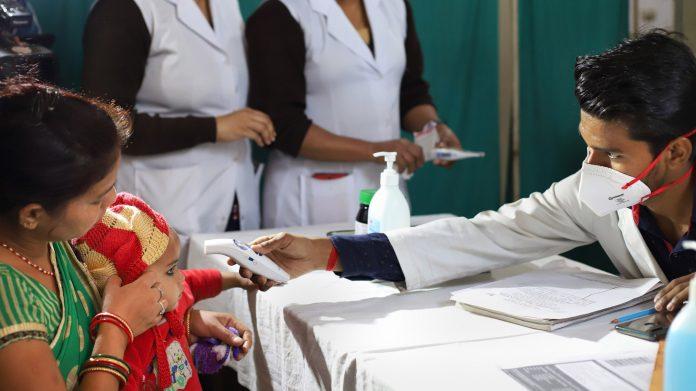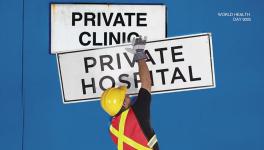COVID-19: Make Test and Treatment in Private Sector Free

Image Courtesy: PTI
Amidst rising concerns on the increasing number of COVID-19 cases, both the Central and state governments have stepped up containment efforts. However, the structural weakness of our public health system would slow down the containment strategy of contact, test and treat, especially in case of a community spread.
The neglect of the public health system over the years has weakened the resilience of our health system to face disease outbreaks, such as COVID-19. According to the National Health Accounts (NHA) 2016-17, India’s total health expenditure constitutes around 3.8% of the GDP (gross domestic product) and the share of government expenditure on health is 1.2%, way below the 6% criteria prescribed by World Health Organisation or WHO. The share of capital expenditure of the public and private sector constitutes only 7.2% of total health expenditure. The share of capital expenditure, i.e, the investment for health infrastructure is only a fraction of public health expenditure.
This appalling negligence on public health infrastructure resulted in insufficient health infrastructure and healthcare human resource in the public sector. As per the National Health Profile 2019, there are 25,778 hospitals in the public sector with 7, 31,986 beds. The number of urban hospitals is only 4,375 with 44,8711 beds.
The data from 16 states on the number of rural hospitals includes the primary health centres (PHC). All states have included the number of Community Health Centers (CHC) as rural hospitals. The facilities in CHCs are very poor and not in a position respond to COVID-19 type emergencies. Further, the urban public health facilities many not able to cater to the required treatment, such as ventilators etc., if there are a huge number of patients.
The lack of adequate public health infrastructure also reflected in the inadequate healthcare human resources in the public sector. As per the National Health Profile, out of 11,54,686 regarded allopathic doctors in India, only 1,16,757 are working with the government. This shows a huge deficit of doctors in the public sector.
Further, the public sector also faces a huge deficit in other healthcare human resources, such as nurses and health workers. The community health workers, an important factor in the containment of disease outbreaks, are not trained to respond to disease outbreaks. There are 54,099 male and 2,19,326 female health workers in rural India. The female health workers are trained in maternal and child health.
Many states have not filled the vacancies for multi-purpose health workers for a long time. Though 80% of COVID-19 infected people do not require hospitalisation considering the speed of spread of diseases, the crowding of hospitals is a real possibility. Activities like contact tracing and regular follow-up of suspected cases, which is critical in preventing the spread, is being carried out by mainly by health workers.
The ICMR testing advisory shows that the diagnostic test costs Rs 4,500. Currently, there around 106 test centres/collection hubs along with confirmatory test in National Virology Institute in Pune. There is already a demand to amend the test eligibility criteria to include all pneumonia patients. WHO is also advising countries to carry out more tests to enhance effective containment. The ICMR already has given conditional approval to the private sector to carry out the tests and has called for free tests. This call for the free test in the private sector remains only in paper, unless the government provides free test kits or reimbursement.
The constraints of public health infrastructure make it inventible to use the private sector for tests and treatment of COVID-19 in case of community spread. In places like Delhi, the government has already listed private healthcare facilities for clinical management of the disease. In case of the spread of infection, it is inevitable that more private sector hospitals and laboratories will be pressed into action.
The government has already instructed inclusion of COVID-19 as part of the insurance scheme and for beneficiaries of government-sponsored schemes like Ayushman Bharat, for getting free test and treatment. However, the majority of the population are outside these schemes, and faces the threat of catastrophic expenditure for tests and treatment in the private sector. The government should step in to provide free tests and treatment to people within their nearest health facility, whether it is a private or public health facility. The government can provide reasonable compensation to the private sector for their services. Such a measure would ease the pressure on the public sector and enhance the ability to contain the disease.
The spike in prices of masks and hand sanitisers is a signal of things to come if we allow the market to operate without regulation. The private sector, irrespective of their assurances on self-discipline, poses a potential threat of exploitative prices. Though healthcare falls under the state list, there is nothing in the Constitution to prevent the Central government to step in to extend free test and treatment to people in the private sector.
Considering the threat of COVID-19, Spain has put all private hospitals under government control indefinitely. The Indian government should take decisive steps to extend free tests and treatment to people even in private sector labs and hospitals.
The writer is associated with the Third World Network. The views are personal.
Get the latest reports & analysis with people's perspective on Protests, movements & deep analytical videos, discussions of the current affairs in your Telegram app. Subscribe to NewsClick's Telegram channel & get Real-Time updates on stories, as they get published on our website.
























